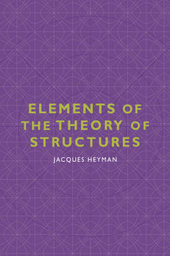
|
Elements of the Theory of Structures
Hardback
Main Details
| Title |
Elements of the Theory of Structures
|
| Authors and Contributors |
By (author) Jacques Heyman
|
| Physical Properties |
| Format:Hardback | | Pages:152 | | Dimensions(mm): Height 235,Width 159 |
|
| Category/Genre | Maths for engineers
Structural engineering |
|---|
| ISBN/Barcode |
9780521550659
|
| Classifications | Dewey:624.17 |
|---|
| Audience | | Professional & Vocational | |
|---|
| Illustrations |
3 Tables, unspecified; 87 Line drawings, unspecified
|
|
Publishing Details |
| Publisher |
Cambridge University Press
|
| Imprint |
Cambridge University Press
|
| Publication Date |
13 June 1996 |
| Publication Country |
United Kingdom
|
Description
A good grasp of the theory of structures - the theoretical basis by which the strength, stiffness and stability of a building can be understood - is fundamental to structural engineers and architects. Yet most modern structural analysis and design is carried out by computer, with the user isolated from the processes in action. This book, therefore, provides a broad introduction to the mathematics behind a range of structural processes - to help today's structural engineers and practising architects gain a better intuitive understanding. The basic structural equations have been known for at least 150 years, but modern plastic theory has opened up a fundamentally new way of advancing structural theory. Paradoxically, the powerful plastic theorems can be used to examine 'classic' elastic design activity, and strong mathematical relationships exist between these two approaches. Some of the techniques used in this book may be familiar to the reader, and some may be new, but each of the topics examined will give the structural engineer valuable insight into the basis of the subject. This lucid volume provides a valuable read for structural engineers and others who wish to deepen their knowledge of the structural analysis and design of buildings.
Reviews"Elements of the Theory of Structures has become one of this reviewer's prize possessions. Anyone with a love of structures, an appreciation of the practical, and adequate mathematical preparation should get this book." A.F. Martin, Applied Mechanics Review
|